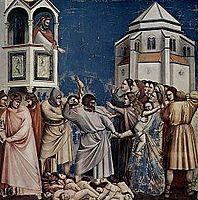Feast of the Holy Innocents

The story of the massacre of the Holy Innocents is described in the Gospel of St Matthew. The Three Kings, following the star, come to King Herod, the Roman-appointed King of the Jews, looking for Jesus the promised newborn Messiah. Herod asks them to return to him after they have found him.
The star leads the Magi to the infant Jesus, with Mary and Joseph. They adore him and offer their gifts of gold, frankincense and myrrh - but then they are warned by an angel in a dream not to return to Herod and instead leave by a different route.
Herod then ordered the execution of all newborn boys in the vicinity of Bethlehem.
The Gospel explains that this was the fulfilment of an Old Testament prophecy: "Then was fulfilled that which was spoken through Jeremiah the prophet, saying: 'A voice is heard in Ramah, mourning and great weeping, Rachel weeping for her children and refusing to be comforted, because her children are no more.'"
The exact number of babies killed is not known. Medieval chronicles speak of hundreds or even thousands, but Bethlehem was only a small town so in reality there must have been far fewer victims.
No other account of this event has been found, other than the Gospel of Matthew - however many historians point out that Herod was such a brutal ruler, this was likely to be one of his smaller atrocities. The Roman Jewish historian Josephus described how Herod even killed his own sons.
From Byzantine times onwards this tragic story has assumed an important place in Christian tradition in music, drama, poetry and art. The Coventry Carol from the medieval mystery play The Pageant of the Shearmen and Tailors is a lament sung by mothers of Bethlehem for their lost babies.
For a film of Westminster Cathedral choir singing the Coventry Carol see: www.youtube.com/watch?v=QIvH5GdY4JE
On Sunday, Euro Med Human Rights organization issued a statement confirming that more than 10,000 children have been killed in Gaza in the past two months.












